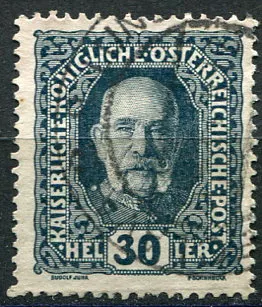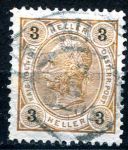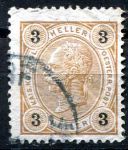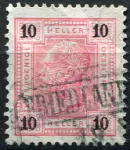- Home
- Philately: postage stamps
- Philately: stamps all over the world
- Europe
- Austria-Hungary
- Embossed
- (1916) MiNr. 193 - O - Austria-Hungary - Franz Joseph I.
(1918) MiNr. 193 - O - Austria-Hungary - stamp from the series: emperor Franz Joseph I.
Austria-Hungary - postage stamps from the series

| Code: | RAUH-193r |
| Producer: | Rakousko-Uhersko |
| Price: | 0,34 EUR |
| Availability: | Sold out - do not order! |
| Stock: | 0 Pcs |
| Denomination of the stamp: | 30 hal. |
| Year: | 1916 |
| Condition: | O |
| Catalogue no. (MICHEL): | 193 |
| Cat. number (St. Gibbons): | 255 |
| Cat. number (Yvert et Tellier): | 151 |
- condition and postmark of the stamp - according to the photo
Emperor Franz Joseph I on postage stamps: an iconic ruler in the history of philately
Emperor Franz Joseph I, who ruled the Austrian Monarchy and later Austria-Hungary from 1848 to 1916, has become one of the most iconic monarchs in European history. His likeness first appeared on postage stamps in the mid-19th century and has remained a permanent fixture in many historical collections ever since. Postage stamps bearing the portrait of Franz Joseph I serve not only as postal documents of their time, but also as an exceptional source of knowledge of political, cultural and aesthetic history.
First stamps with the portrait of the Emperor
The first stamp depicting Franz Joseph I was issued in 1850. This issue replaced the earlier stamps with the portrait of Emperor Ferdinand I and became part of the standard postal rate in the monarchy. The stamps were printed using the letterpress technique and depicted the young emperor in a profile portrait inspired by the classical aesthetic. The appearance of the stamps evolved over time as the Emperor aged and the style of official graphics changed.
Language mutations and national differences
Due to the multinational nature of Austria-Hungary, stamps featuring Franz Joseph I were issued in different language mutations. Variants with inscriptions in German, Hungarian, Croatian and Czech can be found. This reflects not only the political reality of the empire, but also the efforts to adapt the postal system to the individual crown states. This variety makes the stamps with the Kaiser particularly attractive for collectors.
Changes in design and printing techniques
Postage stamps featuring Franz Joseph I underwent significant evolution during the 66 years of his reign. In addition to changes in the portrait form, there were also changes in printing techniques - from the original letterpress to etching and steel printing to multi-colour intaglio printing in later issues. The development of the stamps thus follows the technological possibilities and aesthetic trends of the individual decades.
Stamps as a historical document
Stamps with the portrait of Franz Joseph I represent an important historical source. In addition to the likeness of the monarch himself, they provide information about the denominations, postal rates, state symbols and the language policy of the monarchy. They also provide an interesting starting point for the study of the cultural development and official representation of power in the 19th and early 20th centuries.
The Emperor in the Shadow of Dissolution
The last stamps featuring the portrait of Franz Joseph I were issued just before his death in 1916. By that time, the monarchy was already facing major internal crises and was approaching its demise. Stamps from this late period often carry an air of nostalgia and at the same time document the last phase of the existence of one of the most important European states.
Frequently Bought Together - (1918) MiNr. 193 - O - Austria-Hungary - stamp from the series: emperor Franz Joseph I.
From the Same Category - (1918) MiNr. 193 - O - Austria-Hungary - stamp from the series: emperor Franz Joseph I.
- stamp from the series - condition and postmark of the stamp - according to the photo
- stamp from the series B = perf. 13:13 - stamp condition and postmark - as per photo
- stamp from the series - condition and postmark of the stamp - according to the photo



